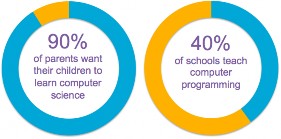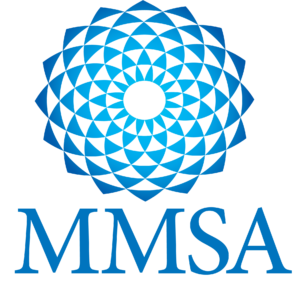Support K-12 Computer Science Education in Maine
This post is from 2017. Find the latest news and information about MMSA and computer science on our blog, mmsa.org/blog.

Computer science drives job growth and innovation throughout our economy and society. Computing occupations are the number 1 source of all new wages in the U.S. and make up two-thirds of all projected new jobs in STEM fields, making Computer Science one of the most in-demand college degrees. And computing is used all around us and in virtually every field. It’s foundational knowledge that all students need. But computer science is marginalized throughout education. Fewer than half of U.S. schools offer any computer science courses and only 8% of STEM graduates study it. We need to improve access for all students, including groups who have traditionally been underrepresented.

Computer science in Maine
Maine currently has 1,144 open computing jobs (2.7 times the average demand rate in Maine).
- The average salary for a computing occupation in ME is $73,150, which is significantly higher than the average salary in the state ($43,260).
- Maine had only 96 computer science graduates in 2014; only 9% were female.
- Only 165 high school students in Maine took the AP Computer Science exam in 2016; only 14% were female; only 4 students were Hispanic or Latino; no students were Black; only 1 student was Native American or Alaska Native; no students were Native Hawaiian or Pacific Islander.
- Only 38 schools in ME (27% of ME schools with AP programs) offered the AP Computer Science course in 2015-2016. There are fewer AP exams taken in computer science than in any other STEM subject area.
What can you do to improve K-12 CS education?
 Call on your school to expand computer science offerings at every grade level.
Call on your school to expand computer science offerings at every grade level.- Ask your local school district to allow computer science courses to satisfy a core math or science requirement.
- Visit www.code.org/educate/3rdparty to find out about courses and curriculum from a variety of third parties, including Code.org.
- Visit www.code.org/promote/ME to learn more about supporting computer science in your state.
- Sign the petition at www.change.org/computerscience to join 100,000 Americans asking Congress to support computer science.
Code.org’s Impact in Maine
There are 1,060 teacher accounts and 33,776 student accounts in Code Studio in Maine.
Code.org, its regional partner(s) Educate Maine and the Maine Mathematics and Science Alliance, and 1 facilitator have provided professional learning for 245 teachers in CS Fundamentals (K-5) and 2 teachers in Computer Science Principles in Maine.
“Computer Science is a liberal art: it’s something that everybody should be exposed to and everyone should have a mastery of to some extent.”
— Steve Jobs
What can the federal government do to support computer science in grades K-12?
Access to computer science courses is a bipartisan issue that can be addressed without adding to the Federal budget. Tell your representatives in Washington, D.C. that you support funding to expand access to this foundational 21st-century subject in your community that will America remain secure and globally competitive. Over 100,000 Americans, CEOs of the largest companies in every major industry, 29 governors, and major K-12 education leaders have all joined forces to call on Congress to support this idea. You can see their open letter (and add your name in support) at www.change.org/computerscience.
What can your state do to improve computer science education?
States and local school districts need to adopt a broad policy framework to provide all students with access to computer science. The following nine recommendations are a menu of best practices that states can choose from to support and expand computer science. Not all states will be in a position to adopt all of the policies. Read more about these 9 policy ideas at https://code.org/files/Making_CS_Fundamental.pdf and see our rubric for describing state policies at http://bit.ly/9policiesrubric.
Maine has not yet created a state plan for K-12 computer science. A plan that articulates the goals for computer science, strategies for accomplishing the goals, and timelines for carrying out the strategies is important for making computer science a fundamental part of a state’s education system.
Maine does not yet have rigorous computer science standards publicly available across K-12. Computer science has often been confused with broader technology education in schools. The state could strengthen its computer science programs by publicly adopting discrete standards for computer science focused on both the creation and use of software and computing technologies at all levels of K-12 education. These standards can be guided by the concepts, practices, and recommendations in the K-12 Computer Science Framework, found at http://www.k12cs.org.
Maine does not yet provide dedicated funding for rigorous computer science professional development and course support. Although funds may be available via broader programs, the state can strengthen its computer science programs by creating specific opportunities to bring computer science to school districts, such as matching fund programs.
Maine does not yet have clear certification pathways for computer science teachers. The expansion of K-12 computer science education is hampered by the lack of qualified computer science teachers. We can grow their ranks by creating clear, navigable, and rewarding professional paths for computer science teachers.
Maine has not yet established programs at institutions of higher education to offer computer science to pre-service teachers. The computer science teacher shortage can be addressed by exposing more preservice teachers to computer science during their required coursework or by creating specific pathways for computer science teachers.
Maine does not yet have dedicated computer science positions in state or local education authorities. Creating a statewide computer science leadership position within the state education authority can help expand state-level implementation of computer science education initiatives. Similar positions at the local level could support districts’ expansion of course offerings and professional development.
Maine does not yet require that all secondary schools offer computer science. The state can support the expansion of computer science courses by adopting policies that require schools to offer a computer science course based on rigorous standards, with appropriate implementation timelines and allowing for remote and/or in-person courses.
Maine does not yet allow computer science to count for a core graduation requirement. States that count computer science as a core graduation requirement see 50% more enrollment in their AP Computer Science courses and increased participation from underrepresented minorities. Find out how other states allow computer science to count towards graduation at http://bit.ly/1Is6YXS.
Maine does not yet allow computer science to count as a core admission requirement at institutions of higher education. Admission policies that do not include rigorous computer science courses as meeting a core entrance requirement, such as in mathematics or science, discourage students from taking such courses in secondary education. State leaders can work with institutions of higher education to ensure credit and articulation policies align with secondary school graduation requirements.
Follow us!
Join our efforts to give every student in every school the opportunity to learn computer science. Learn more at code.org, or follow us on Facebook and Twitter.


